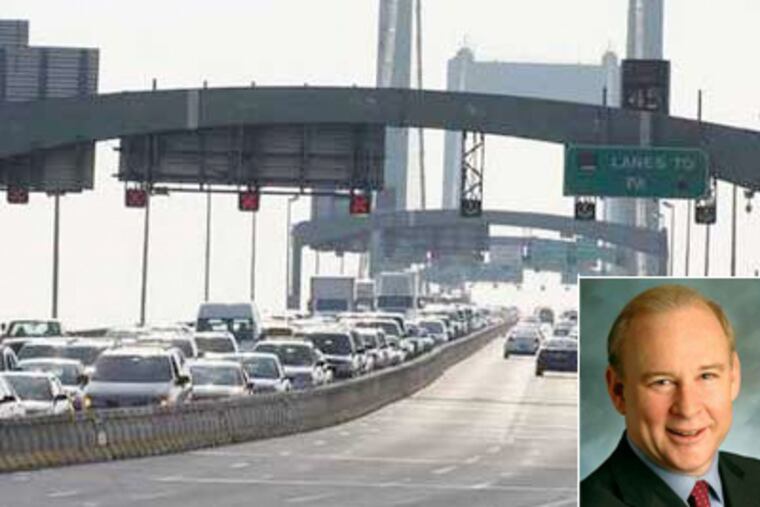Pa. treasurer urges major changes to DRPA rules
Proposing to "reform a culture," Pennsylvania State Treasurer Robert McCord on Friday recommended major changes to the rules of the Delaware River Port Authority to end conflicts of interest and to temporarily halt spending on law firms and other professional services.

Proposing to "reform a culture," Pennsylvania State Treasurer Robert McCord on Friday recommended major changes to the rules of the Delaware River Port Authority to end conflicts of interest and to temporarily halt spending on law firms and other professional services.
McCord, a member of the board of the beleaguered bistate agency, said a meeting set for Wednesday to consider other measures "should be the beginning, not the end, of a reform process at the DRPA."
"I am concerned about what could be a rush to get out of the headlines - instead of a sustained effort that truly repairs what is broken," McCord said in a letter to DRPA board Chairman John Estey.
McCord urged a comprehensive examination of the DRPA's inner workings, as well as prompt action on several fronts.
He said he was concerned about the "overtly political organizational culture of the authority," and cited "real or perceived conflicts of interest of board members; the authority's employment practices, specifically the exorbitant executive-level pay, car allowances and perks; the awarding of grants and contracts; and a general sense that the authority is a political patronage operation unconcerned with the rising toll charges levied on the public to pay for all this political largesse."
The DRPA operates four Delaware River toll bridges and the PATCO commuter rail line between Philadelphia and South Jersey. The bistate agency, with an annual budget of $300 million, is governed by a 16-member board, with eight members from each state.
McCord said he would offer at Wednesday's 10 a.m. board meeting proposals to prohibit:
Any board member, manager, or family member from having a financial interest in or being employed by any firm doing business with the DRPA. Such a prohibition would continue for a year after a person left the DRPA.
Any board member or manager from recommending the hiring of any person by a company doing business with the DRPA.
The outside employment of any DRPA executive.
McCord also said he would ask the board to take these immediate steps:
Suspension of all economic development grants. Until a formal plan is adopted for "the use, consideration, evaluation and approval" of such grants, all should be halted.
Suspension of new contracts or legal service bills. Except for contracts critical to the safe maintenance of DRPA bridges and railroad, no new ones should be made until a "strong conflict-of-interest policy is adopted to prevent commissioners, executives, and family members from having a financial interest or being employed" in companies doing business with the authority.
Begin a legal investigation into insurance procedures. An oral agreement that apparently requires a Pennsylvania insurance broker, the Graham Co., to share fees and commissions with a New Jersey insurance broker, Willis of New Jersey Inc., needs to be investigated to determine if it is legal and appropriate.
Conduct performance and forensic audits. Such audits are needed to "identify or test the adequacy of internal protocols or safeguards intended to prevent perceived or actual conflicts of interest, potential for self-dealing or the appropriate nature of various expenditures.. . ."
Responding to demands for change by Govs. Christie and Rendell and several board members, Estey last week proposed 16 changes to the DRPA's bylaws. He sent the details of the proposals to each governor, but not to the board members or the public.
McCord said that left him and other board members without enough information.
"Recognizing that the 'devil is in the details,' it is irresponsible to consider and vote on an amendment without first being afforded an opportunity to read and review its contents," McCord said.
Also on Friday, state legislators from Pennsylvania and New Jersey said they would unveil on Wednesday proposed legislation to change the DRPA's federal compact.
Pennsylvania Rep. Mike Vereb (R., Montgomery) and New Jersey Assemblyman Domenick DiCicco (R., Gloucester) said they wanted to repeal the DRPA's ability to spend money on "economic development" in New Jersey and Pennsylvania.
Similar legislation will be introduced in the Pennsylvania Senate by State Sen. John Rafferty (R., Montgomery), who will hold hearings next month on the DRPA's problems.
A change in the agency's governing compact would require approval by both states' legislatures and governors, as well as Congress and the president.
The DRPA has spent nearly $400 million in the last decade on such projects as Lincoln Financial Field, the Kimmel Center, the National Constitution Center, the Camden Riversharks' baseball stadium, a soccer stadium complex on the Chester waterfront, the National Museum of American Jewish History, the President's House memorial near Independence Hall, and moving the Barnes Foundation collection from Lower Merion to Philadelphia.